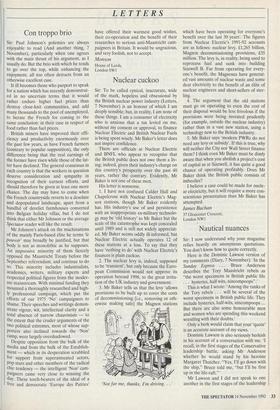LETTERS Con troppo brio
Sir: Paul Johnson's polemics are always enjoyable to read (And another thing, 7 November), particularly when one agrees with the main thrust of his argument, as I usually do. But the brio with which he tends to go over the top, while enhancing the enjoyment, all too often detracts from an otherwise excellent case.
It ill becomes those who purport to speak for a nation which has recently demonstrat- ed in no uncertain terms that it would rather endure higher fuel prices than destroy close-knit communities, and add many thousands to the pool of unemployed, to berate the French for coming to the same conclusion: in their case in respect of food rather than fuel prices.
British miners have improved their effi- ciency and productivity enormously over the past few years, as have French farmers (contrary to popular supposition), the only difference being that the real earnings of the former have risen while those of the lat- ter have declined. The general consensus in each country is that the workers in question deserve consideration and sympathy in recognition of their earnest efforts, and should therefore be given at least one more chance. The day may have to come when the French countryside reverts to a desolate and depopulated landscape, apart from a handful of derelict farmhouses converted into Belgian holiday villas, but I do not think that either Mr Johnson or the average Spectator reader will like the result.
Mr Johnson's attack on the machinations of the mainly Paris-based elite he terms 'le Pouvoir' may broadly be justified, but that body is not as monolithic as he supposes. An impressive minority of them fiercely opposed the Maastricht Treaty before the September referendum, and continue to do so. This minority includes industrialists, academics, writers, military experts and respected political figures from the moder- ate mainstream. With minimal funding they mounted a thoroughly researched and high- ly professional campaign, which put the efforts of our 1975 'No' campaigners to shame. Their speeches and writings demon- strate vigour, wit, intellectual clarity and a total absence of narrow chauvinism — to the extent that the cruder arguments of the two political extremes, most of whose sup- porters also inclined towards the `Non' camp, were largely overshadowed.
Despite opposition from the bulk of the media and from the bulk of the Establish- ment — which in its desperation scrabbled for support from superannuated actors, Pop stars and other members of the radical chic tendency — the intelligent 'Non' cam- paigners came very close to winning the day. These torch-bearers of the ideal of a free and democratic 'Europe des Patries' have offered their warmest good wishes, their co-operation and the benefit of their researches to serious anti-Maastricht cam- paigners in Britain. It would be ungracious, and very foolish, not to accept.
Monson
House of Lords, London SW1


































































 Previous page
Previous page